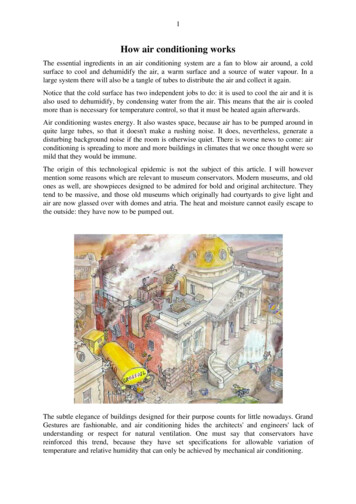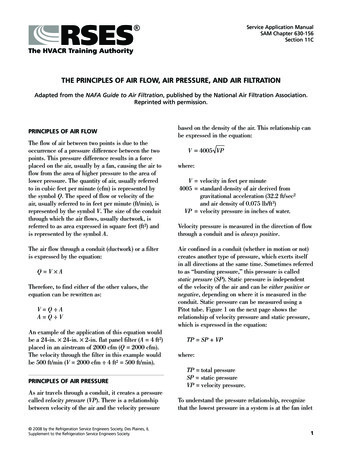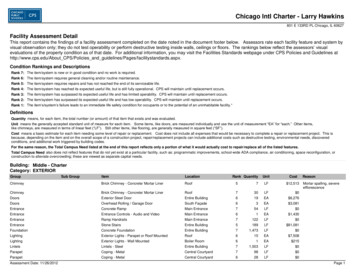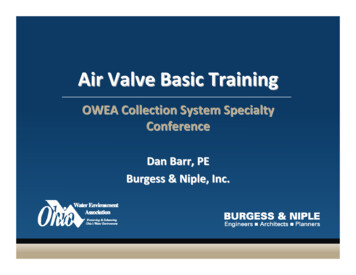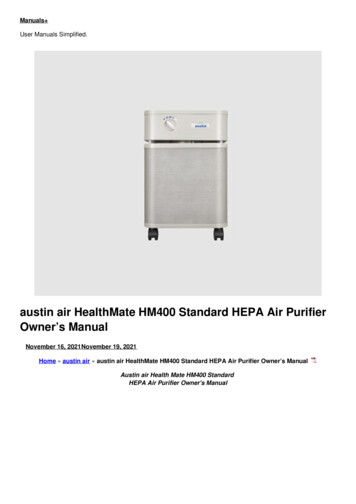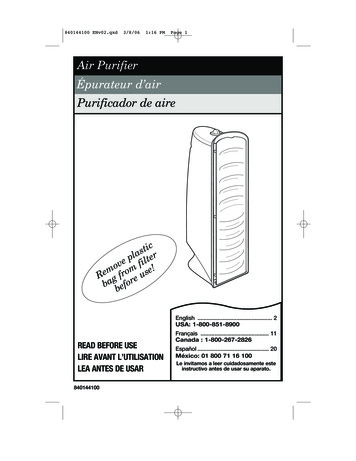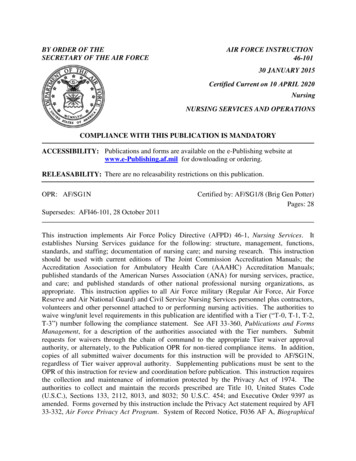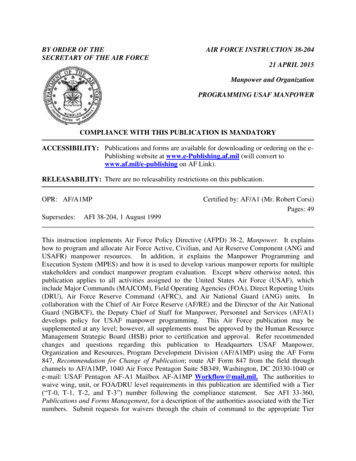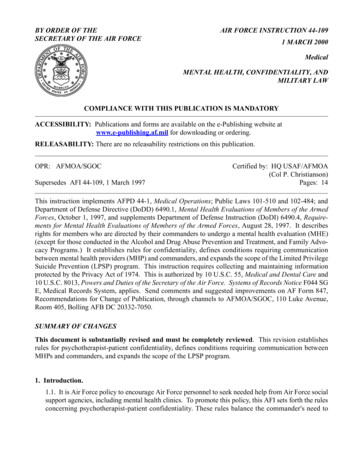
Transcription
BY ORDER OF THESECRETARY OF THE AIR FORCEAIR FORCE INSTRUCTION 44-1091 MARCH 2000MedicalMENTAL HEALTH, CONFIDENTIALITY, ANDMILITARY LAWCOMPLIANCE WITH THIS PUBLICATION IS MANDATORYACCESSIBILITY: Publications and forms are available on the e-Publishing website atwww.e-publishing.af.mil for downloading or ordering.RELEASABILITY: There are no releasability restrictions on this publication.OPR: AFMOA/SGOCSupersedes AFI 44-109, 1 March 1997Certified by: HQ USAF/AFMOA(Col P. Christianson)Pages: 14This instruction implements AFPD 44-1, Medical Operations; Public Laws 101-510 and 102-484; andDepartment of Defense Directive (DoDD) 6490.1, Mental Health Evaluations of Members of the ArmedForces, October 1, 1997, and supplements Department of Defense Instruction (DoDI) 6490.4, Requirements for Mental Health Evaluations of Members of the Armed Forces, August 28, 1997. It describesrights for members who are directed by their commanders to undergo a mental health evaluation (MHE)(except for those conducted in the Alcohol and Drug Abuse Prevention and Treatment, and Family Advocacy Programs.) It establishes rules for confidentiality, defines conditions requiring communicationbetween mental health providers (MHP) and commanders, and expands the scope of the Limited PrivilegeSuicide Prevention (LPSP) program. This instruction requires collecting and maintaining informationprotected by the Privacy Act of 1974. This is authorized by 10 U.S.C. 55, Medical and Dental Care and10 U.S.C. 8013, Powers and Duties of the Secretary of the Air Force. Systems of Records Notice F044 SGE, Medical Records System, applies. Send comments and suggested improvements on AF Form 847,Recommendations for Change of Publication, through channels to AFMOA/SGOC, 110 Luke Avenue,Room 405, Bolling AFB DC 20332-7050.SUMMARY OF CHANGESThis document is substantially revised and must be completely reviewed. This revision establishesrules for psychotherapist-patient confidentiality, defines conditions requiring communication betweenMHPs and commanders, and expands the scope of the LPSP program.1. Introduction.1.1. It is Air Force policy to encourage Air Force personnel to seek needed help from Air Force socialsupport agencies, including mental health clinics. To promote this policy, this AFI sets forth the rulesconcerning psychotherapist-patient confidentiality. These rules balance the commander's need to
2AFI44-109 1 MARCH 2000know the mental well being of members of his/her command with the mental health patient's need forconfidentiality and privacy.1.2. This AFI supplements the mandatory requirements for commander-directed mental health evaluations (CDE) found in DoD Directive 6490.1, Mental Health Evaluations of Members of the ArmedForces, October 1, 1997, and DoD Instruction 6490.4, Requirements for Mental Health Evaluations ofMembers of the Armed Forces, August 28, 1997. Portions of this AFI are based on these DoD documents and must be read in conjunction with them.1.3. Records Disposition. Ensure that all records created by this instruction are maintained and disposed of IAW AFMAN 37-139, Records Disposition Schedule.2. Psychotherapist-Patient Confidentiality.2.1. General Rule. Communications between a patient and a psychotherapist or an assistant to a psychotherapist made for the purpose of facilitating diagnosis or treatment of the patient’s mental or emotional condition are confidential communications and shall be protected from unauthorized disclosure.However, confidential communications will be disclosed to persons or agencies with a proper andlegitimate need for the information and who are authorized by law or regulation to receive it, unlessthe evidentiary privilege described in paragraphs 2.2. through 2.5. applies. See also the limited protections afforded confidential communications under the Limited Privilege Suicide Prevention Programin paragraphs 3.5. through 3.5.1.3.2.1.1. In cases not arising under the Uniform Code of Military Justice (UCMJ), the psychotherapist may appeal requests for confidential communications by persons or agencies to the installation Staff Judge Advocate (SJA).2.2. Military Rule of Evidence. This evidentiary rule provides a patient has a privilege to refuse todisclose and to prevent any other person from disclosing a confidential communication made betweenthe patient and a psychotherapist or an assistant to the psychotherapist, in a case arising under theUCMJ, if such communication was made for the purpose of facilitating diagnosis or treatment of thepatient's mental or emotional condition. There is no privilege under this rule:2.2.1. when the patient is dead;2.2.2. when the communication is evidence of spouse abuse, child abuse, or neglect or in a proceeding in which one spouse is charged with a crime against the person of the other spouse or achild of either spouse;2.2.3. when federal law, state law, or service regulation imposes a duty to report information contained in a communication;2.2.4. when a psychotherapist or assistant to a psychotherapist believes that a patient's mental oremotional condition makes the patient a danger to any person, including the patient;2.2.5. if the communication clearly contemplated the future commission of a fraud or crime or ifthe services of the psychotherapist are sought or obtained to enable or aid anyone to commit orplan to commit what the patient knew or reasonably should have known to be a crime or fraud;2.2.6. when necessary to ensure the safety and security of military personnel, military dependents,military property, classified information, or the accomplishment of a military mission;
AFI44-109 1 MARCH 200032.2.7. when an accused offers statements or other evidence concerning his mental condition indefense, extenuation, or mitigation, under circumstances not covered by R.C.M. 706 or Mil. R.Evid. 302. In such situations, the military judge may, upon motion, order disclosure of any statement made by the accused to a psychotherapist as may be necessary in the interests of justice; or2.2.8. when admission or disclosure of a communication is constitutionally required.2.3. Who May Claim the Privilege under Military Rule of Evidence 513. The privilege may beclaimed by the patient or the guardian or conservator of the patient. A person who may claim the privilege may authorize trial counsel or defense counsel to claim the privilege on his or her behalf. Thepsychotherapist or assistant to the psychotherapist who received the communication may claim theprivilege on behalf of the patient. The authority of such a psychotherapist, assistant, guardian, or conservator to so assert the privilege is presumed in the absence of evidence to the contrary.2.4. Limited Applicability of Military Rule of Evidence 513. The evidentiary privilege only applieswhen access to confidential information is being sought for the purpose of a criminal investigation orproceeding under the UCMJ. If access is requested for any other purpose, the evidentiary privilegehas no application and the general rule in paragraph 2.1. applies.2.5. Procedure to follow when Military Rule of Evidence 513 issues arise. When disclosure of confidential communications is requested from a MHP for the purpose of a criminal investigation or proceeding under the UCMJ, the MHP must determine if an exception to the general rule of privilegeapplies that authorizes disclosure. If legal advice is needed in making this decision, the MHP shallconsult the installation SJA, as provided in subparagraph 2.5.3. below.2.5.1. If an exception to the privilege exists, the communication is not privileged and should bedisclosed to the requestor.2.5.2. If an exception does not exist, the MHP should inform the requestor that the privilege isbeing claimed on behalf of the patient; that information sought will not be disclosed; and that anydisagreement with this decision should be directed to the attention of the installation SJA. However, if the patient waives the privilege, the information should be disclosed by the MHP.2.5.3. Questions concerning the applicability of psychotherapist-patient privilege, whether fromthe MHP or requestor, will be referred to the installation SJA for determination. When thisoccurs, the confidential communications will be disclosed to the SJA to determine whether anexception to the privilege applies and whether the information should be disclosed to therequestor. While the SJA’s determination on disclosure of the information is binding on the MHPand requestor; the ultimate issue of admissibility at trial is reserved to the military judge.2.6. Guidance on how to respond to subpoenas and court orders for production of MHP files will beobtained from the installation SJA.3. Limited Privilege Suicide Prevention (LPSP) Program.3.1. Program Objective. The objective of the LPSP program is to identify and treat those Air Forcemembers who, because of the stress of impending disciplinary action under the Uniform Code of Military Justice (UCJM), pose a genuine risk of suicide. In order to encourage and facilitate treatment,the LPSP program provides limited confidentiality under the enumerated circumstances.
4AFI44-109 1 MARCH 20003.2. Program Eligibility. Any Air Force member is eligible for entry in the LPSP after the memberhas been officially notified, verbally or in writing, that he or she is under investigation or is suspectedof the commission of an offense under the UCMJ.3.3. Initiation. If, subsequent to the notification described in paragraph 3.2., defense counsel, trialcounsel, law enforcement official, staff judge advocate, first sergeant, squadron executive officer orany other individual officially involved in the processing of the disciplinary action has a good faithbelief that the member may present a risk of suicide, the individual shall communicate that concern tothe member’s immediate commander with a recommendation that the member be referred for a mentalhealth evaluation and possible placement in the LPSP program.3.3.1. Based on the provided information or relevant information from other sources, and afterconsultation with MHP, the commander may refer the member for a MHE.3.3.1.1. The provisions of paragraphs 4. to 4.9.3. apply to any referral under this paragraph.3.3.2. The MHP will evaluate the member to determine if the member poses a risk of suicide, andif so, initiate treatment.3.4. Duration. The limited protections provided by the LPSP program shall apply only so long as theMHP determines that there is a continuing risk of suicide. The MHP shall notify the member’s immediate commander when, in his or her professional opinion, the member no longer poses a risk of suicide and shall appropriately annotate the member’s medical records. The limited protections affordedby the LPSP program cease at that time. However, matters that were disclosed while the member wasin the LPSP program remain protected.3.5. Limited Protection. Air Force members enrolled in the LPSP program are granted limited protection with regard to information revealed in, or generated by their clinical relationship with MHPs.Such information may not be used in the existing or any future UCMJ action or when weighing characterization of service in a separation. Commanders or persons acting under their authority, such asstaff judge advocates, squadron executive officers, or first sergeants, may use the information for anyother purposes authorized by law, this instruction, and other Air Force instructions and programs.3.5.1. The limited protection provided by the LPSP program does not apply to:3.5.1.1. The introduction of evidence for impeachment or rebuttal purposes in any proceedingin which evidence generated by, and during the LPSP relationship has first been introduced bythe member.3.5.1.2. Disciplinary or other action based on independently derived evidence (other thanfrom the LPSP relationship).3.5.1.3. Any information or evidence acquired or created by MHPs or other medical providersbefore placement in the LPSP program or subsequent to release from the program, except forthose medical summaries or other similar documents created after release from the programbut which pertain to treatment while in the LPSP program.3.6. Disclosing Case File Information.3.6.1. MHP staff engaged in LPSP programs may disclose case-file information of military members, including providing copies of documentation to:
AFI44-109 1 MARCH 200053.6.1.1. Other medical personnel directly engaged in evaluating and treating program participants. This would include MHP staff at other facilities to which the member may be referred.3.6.1.2. VA treatment personnel when members are transferred directly to a VA facility.3.6.1.3. The confinement facility commander when members are transferred to a confinementfacility as a result of an ongoing court-martial.3.6.1.4. Other authorized personnel with a need to know in the official performance of theirduties. See paragraph 2.1. However, if the disclosure is for the purpose of a criminal investigation or proceeding under the UCMJ, the privilege in Military Rule of Evidence 513(described in paragraph 2.2.) will preclude disclosure unless an exception applies. MHPsshould consult with the staff judge advocate before any release made under this provision.Also see paragraph 6.2. for when MHP are required to contact the commander.3.6.2. Before an MHP or other medical provider releases any information to sources other thanthose designated in this instruction, the member must grant permission by signing and dating astatement (AF Form 2746) specifying what information may be released and to whom it may bereleased.3.6.3. Do not review, handle, or disclose any LPSP case file information to any person or agencyunless the Privacy Act of 1974 (AFI 37-132) authorizes the disclosure. Disclosures within theDoD are only authorized on a need-to-know basis when personnel need the information to perform official duties.4. Referring Air Force Members for Mental Health Evaluations.4.1. Supervisory personnel, including commanders, may encourage Air Force members to voluntarilyseek mental health care. The Air Force recognizes that members who receive help from mental healthprofessionals can improve their job performance as well as their overall well being, and consciouslyendorses caring involvement by supervisors. Supervisors and commanders may not, however, underany circumstances attempt to coerce members to voluntarily seek a mental health evaluation.4.2. Only the member’s commander may direct the member to undergo a mental health evaluation orto submit to involuntary admission to an inpatient medical or mental health (psychiatric) unit. Thisprovision applies to members of the Air Force Reserve and Air National Guard (Reserve members) onactive and weekend duty status.4.2.1. The following procedures apply to Reserve members in active duty status:4.2.1.1. The Reserve member should be placed on Invitational Travel Orders and referred tothe nearest MTF with appropriate mental health evaluation resources in the case of a commander directed evaluation.4.2.1.2. The Reserve member should also be seen at the Reserve Medical Unit to provide forappropriate profiling and to facilitate the scheduling of the referral.4.2.1.3. If the Reserve member is considered an immediate danger to himself, herself, or others, the member should be kept safe and not left alone until being properly transferred to areceiving facility by emergency medical personnel.4.2.2. On intake for evaluation, mental health staff shall ask whether the member is there voluntarily or at the direction of his or her commander/supervisor. If the member responds with the lat-
6AFI44-109 1 MARCH 2000ter and the commander has not initiated a commander-directed mental health evaluation (CDE)IAW DoDD 6490.1 and DoDI 6490.4, the MHP shall contact the commander to determine if aCDE was intended. If not, the MHP shall inform the member that the evaluation is not required,but may proceed on a voluntary basis if the member chooses. If the commander intended a CDE,the MHP shall ensure the commander follows the prescribed process for a CDE before proceedingwith any evaluation. The MHP shall clearly document the member’s statement and any interaction with the member’s commander in the member’s mental health record.4.2.3. The procedures for a CDE shall be followed whenever a member is directed to undergoinvoluntary psychiatric hospitalization. Procedures for an involuntary psychiatric hospitalizationmust also be followed as directed by DoDI 6490.4, paragraph 6.2.2. Reserve members canundergo involuntary psychiatric hospitalization in a DoD MTF only when on active duty status.4.3. Providers Performing Evaluations. DoDI 6490.4, paragraph 6.3.3. provides the basic guidanceas to who has authority to perform CDEs. Additional guidance for Air Force MTFs follows.4.3.1. Paragraphs 6.3.3.2. and 6.3.3.3. of DoDI 6490.4 do not restrict non-doctoral-level MHPsfrom performing non-CDEs on members or MHEs on other beneficiaries, to include assessmentsof potential dangerousness. Therefore, non-doctoral-level MHPs should continue to practice tothe full scope of their privileges in all situations, except those involving non-emergency and emergency (e.g., imminent dangerousness) CDEs. This includes Air Force Family Advocacy Programassessments, Alcohol and Drug Abuse Prevention and Treatment evaluations, routine outpatientmental health assessments, and carrying out on-call responsibilities. If, in the course of their routine clinical practice, a non-doctoral-level MHP assesses a reasonable risk that a member may beimminently dangerous, he or she will refer the member to a doctoral-level MHP for a definitiveassessment of dangerousness.4.3.2. Emergency CDEs4.3.2.1. Non-psychiatrist physicians who perform CDEs in emergency situations (pendingevaluation by a doctoral-level MHP) must be specifically privileged to do so. Privileges willbe granted based on documented training, beyond that normally provided in medical schooland non-psychiatric residencies, and experience in conducting comprehensive MHEs. Suchprivileges will be documented by adding “Emergency Commander-directed Mental HealthEvaluations” on the privilege list. Privileged MHPs should assist the credentials function inmaking recommendations to the MTF commander concerning privileging.4.3.2.2. If the MTF has neither a doctoral-level MHP nor a non-psychiatrist physician privileged to perform emergency CDEs available, a non-doctoral-level MHP will perform theemergency CDE, pending an evaluation by a doctoral-level MHP.4.3.2.3. When a non-doctoral-level MHP assists a non-psychiatrist physician in an evaluationfor dangerousness, the responsibility for the final judgment rests solely with the non-psychiatrist physician.4.3.2.4. When non-doctoral-level MHPs perform emergency CDEs, one of the followingcourses may be taken:4.3.2.4.1. If the risk of imminent dangerousness cannot reasonably be ruled out, arrangefor evaluation by a doctoral-level MHP within 24 hours, to include transportation, inpatient admission by a privileged physician provider, or a means of continuous direct obser-
AFI44-109 1 MARCH 20007vation, e.g. in the custody of squadron personnel or law enforcement officials on or offbase, until such evaluation can be completed. Provide an interim oral report to the commander at the earliest opportunity. Document this action in the medical record and providea written report to the commander within 72 hours.4.3.2.4.2. If the risk of imminent dangerousness can reasonably be ruled out, arrange forthe required evaluation by a doctoral-level MHP as soon as practical, but within 72 hours.Provide an interim oral report to the commander at the earliest opportunity and documentthis action in the medical record.4.3.2.4.3. If the time requirements cannot be met due to geographical or other factorsbeyond the control of the MTF, arrange for the required evaluations as soon as reasonablypossible.4.3.2.5. MTFs shall establish standard procedures for obtaining doctoral-level evaluations forCDEs or for definitive dangerousness assessments of active duty members (IAW paragraph3.2.1. above) from either civilian providers or military providers if such services will be frequently unavailable within the MTF. This includes facilities with one or fewer doctoral-levelMHPs.4.3.2.6. MTFs shall not violate the least restrictive alternative principle to save MTF financialresources (DoDD 6490.1, paragraph 4.5.2.).4.3.3. Non-emergency CDEs. Qualifications of providers performing non-emergency CDEs arefound in DoDD 6490.1 and DoDI 6490.4.4.4. DoD Directive 6490.1, paragraph 4.6.3.2, does not require discharge of Air Force members witha pattern of imminently dangerous behavior unless they have also been determined to be unsuitablefor continued service based upon a personality disorder which is so severe that the member's ability tofunction effectively in a military environment is significantly impaired, as defined in AFI 36-3208,Administrative Separation of Airman, and AFI 36-3206, Administrative Discharge Procedures forCommissioned Officers. For Air Force members with sufficiently severe personality disorders and apattern of imminently dangerous behavior, the recommendation to the commander should note that,considering the circumstances, separation action should be initiated as soon as reasonably possible.Recommendations for discharge based on mental health diagnoses will be IAW AFI 36-3206 for AirForce officers and AFI 36-3208 for enlisted Air Force members.4.5. Non-doctoral level MHPs will not be sent on deployments in which operation of a mental healthunit or clinic is a primary responsibility unless military doctoral-level MHPs are reasonably availableto provide emergency CDEs. Non-doctoral-level MHPs are not restricted from deployments in whichtheir role is to provide humanitarian or critical incident stress management services IAW AFI 44-153,Critical Incident Stress Management.4.6. Personnel Records. The referring commander will be responsible for providing the personnelrecords to the MHP when the provider requests them as background material for the mental healthevaluation.4.7. Exemptions. MHEs conducted under Air Force Instruction 40-404, Biographical Evaluation andScreening of Troops, are to be included with the exemptions listed in DoD Directive 6490.1, paragraph 4.3.5
8AFI44-109 1 MARCH 20004.8. Pre-Discharge Notifications to Victims of Assault (DoDI 6490.4, paragraph 6.6.1.3). Pendingclarification by DoD (General Counsel), the provider will not notify an assault victim about thepatient’s discharge unless, in the judgment of the MHP, there is a reasonable risk to the health orsafety of the person assaulted. The commander will still be notified.4.9. Independent Review Procedures for Continued Involuntary Psychiatric Hospitalization.Reviews of involuntary inpatient psychiatric hospitalizations of members must be conducted within72 hours of the first admission, whether that occurs in a military or civilian hospital. Time lapsedwhile the member is awaiting transportation or otherwise being detained or observed outside theresponsibility of an inpatient medical facility does not count toward the 72 hours. This does not applyto Reserve members not on active duty who are admitted to civilian facilities.4.9.1. The commander of the Air Force MTF performing the involuntary inpatient psychiatriccare shall appoint a qualified medical officer (refer to DoDI 6490.4, paragraph 6.2.3.1. for qualifications) to conduct the review required by DoDI 6490.4, paragraph 6.2.3. In cases where AirForce members are involuntarily admitted to MTFs operated by other military Services, or whenthe inpatient care is provided in the civilian sector, the Air Force medical facility commanderresponsible for coordinating the care of the Air Force member will work with the commander orofficials of the inpatient facility to ensure the required review is performed. If the medical facilitycommander or a superior directed the mental health evaluation, a commander superior to theofficer directing the evaluation will appoint the review officer, take his or her report, and directany investigation.4.9.2. The reviewing officer will comply with the procedures outlined in DoDI 6490.4, paragraph6.2.3 when conducting an independent review for continued involuntary psychiatric hospitalization. The reviewer will submit his or her written report to the responsible MTF commander orsuperior commander who ordered the review (hereafter referred to as the appointing authority)within 72 hours of the member’s admission. A reviewing officer’s determination that the membershould be released shall be reviewed by appropriate MHPs and the appointing authority, and,absent compelling reasons to the contrary, the member should be released. In the event theappointing authority determines that the member will not be released, the appointing authority willdocument the reason in writing. A copy of this report will be placed in the medical record. Absentnew information, the member may not be involuntarily readmitted for inpatient psychiatric evaluation after the review officer has determined he or she should be released.4.9.3. Inspector General Referrals. When the reviewing officer’s report concludes that the referral or admission was made improperly, the reviewer shall forward the report to the appointingauthority or to the level of command above the referring commander, whichever is higher. Unlessthis officer determines that there is clear and convincing evidence that the reviewer was incorrectin his or her conclusion, the officer will refer the case to the servicing Inspector General for possible investigation and disposition IAW AFI 90-301, Inspector General Complaints.4.10. Training.4.10.1. To comply with DoDD 6490.1, paragraph 4.1 and DoDI 6490.4, paragraph 5.2.4, AirForce units will include “identification, initial management, and referral of active duty Air Forcemembers who are believed to be imminently dangerous” to the topics covered in training conducted IAW AFI 44-154, Community Training: Suicide And Violence Awareness Education.
AFI44-109 1 MARCH 200094.10.2. MAJCOMs, Field Operating Agencies, and Direct Reporting Units will ensure commanders are familiar with the requirements of DoD Directive 6490.1 and DoD Instruction 6490.4.5. Mental Health Inquiries Under Rule for Courts-Martial (R.C.M.) 706. Doctoral-level MHPs willconduct inquiries into a member’s mental responsibility for alleged offenses or mental capacity to standtrial per R.C.M. 706 and Military Rule of Evidence (M.R.E.) 302.6. Communications between MHPs in Air Force MTFs and Commanders.6.1. Appropriate communications between MHPs and commanders aid in managing human resourcesand can improve the therapeutic results for Service members. MHPs are encouraged to discuss thebeneficial effects of commander involvement with members and, whenever possible, to obtain themember's prior consent to the communication with the commander. Some situations may, however,justify contacting the commander without the member's knowledge. In these cases, the MHP should,under ordinary circumstances, consult with another MHP prior to communicating with the commander. The final judgment, however, rests with the member’s own provider.6.2. The MHP is required to contact the commander when:6.2.1. In the MHP's opinion, the member is a danger to self or others, or poses a threat to security;6.2.2. The member is admitted to or discharged from a mental health unit or ward, or when amember is referred for admission to a medical unit by an MHP for a mental health related concern(e.g., detoxification, treatment of a self-inflicted injury, assessment of neurological impairment,etc.);6.2.3. In the MHP's opinion, the member’s mental status has deteriorated to the degree that it maysignificantly affect work or family functioning. (NOTE: “Significantly affect” is defined as posinga risk to self, others, property, security, or the accomplishment of the military mission.)6.2.4. The MHP suspects the existence of family maltreatment, substance abuse, or other childabuse. (Notification to Family Advocacy is also required IAW AFI 40-301, Family Advocacy.)6.3. If the patient consents, the MHP may contact the commander whenever the member would benefit from additional support from the unit.6.4. In fulfilling the requirements of paragraph 6., MHPs will provide the commander the informationrequired for informed decision-making, but should, to the extent possible, maintain the confidentialityof communications from the patient. For example, details of a childhood history of sexual abuse,which has been appropriately addressed, may not be necessary for making a decision about a securityclearance.6.5. Commanders and other personnel receiving information concerning a member's confidentialcommunications shall not disclose such information beyond the extent necessary to ensure accomplishment of the military mission.6.6. Commanders of members certified under the nuclear weapons personnel reliability program shallbe notified of potentially disqualifying information (PDI) by the competent medical authority inaccordance with AFI 36-2104, Nuclear Weapons Personnel Reliability Program, and DoDD 5210.42,Nuclear Weapons Personnel Reliability Program.
10AFI44-109 1 MARCH 20007. Consent Form. A consent form for all categories of mental health patients is provided at Attachment2. Local MTFs may modify the consent form when local conditions dictate, however, each of the elements in Attachment 2 must be addressed.PAUL K. CARLTON, JR., Lt General, USAF, MCSurgeon General
AFI44-109 1 MARCH 200011Attachment 1GLOSSARY OF REFERENCES AND SUPPORTING INFORMATIONReferencesPublic Laws 101-510 and 102-484Manual for Courts-Martial, United States, Current VersionDoDD 5210.42, Nuclear Weapons Personnel Reliability ProgramDoDD 6490.1, Mental Health Evaluation
MHPs and commanders, and expands the scope of the LPSP program. 1. Introduction. 1.1. It is Air Force policy to enc ourage Air Force personnel to seek n eeded help from Air Force social support agencies, including mental heal th clinics. To promote this polic y, this AFI sets forth the rules concerning psychotherapist-patient confidentiality.




